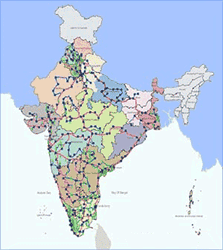|
Telecommunication
networks are the infrastructure for provisioning
infocomm services. All businesses today are
dependent on telecom to continue their day-to-day
operations. The range and quality of services
that can be provisioned is determined by the
quality of the network deployed.
The Reliance Infocomm network
consists of 60,000 kilometers of optical fibre
cables spanning the length and breadth of
India. These cables can carry thousands of
billions of bits per second and can instantly
connect one part of the country with another.
This physical network and its associated infrastructure
will cover over 600
cities and towns in 18 of the country's
21 circles, 229 of the nation’s 323 Long Distance
Charging Areas (LDCAs) and broadband connectivity
to over 190 cities. This infrastructure will
be backed by state-of-the-art information
management systems and a customer-focused
organisation.
 An interesting aspect of the
network is the manner in which these fibres
are interconnected and deployed. Reliance's
architecture is so fault-tolerant that the
chances of failure are virtually nil. Reliance's
ring and mesh architecture topology is the
most expensive component to implement, but
assures the highest quality of uninterrupted
service, even in the event of failure or breakage
in any segment of the network. Reliance has
77 such rings across the country with at least
three alternative paths available in metros.
Connected on this topology, the service has
virtually no chance of disruption in quality
performance. An interesting aspect of the
network is the manner in which these fibres
are interconnected and deployed. Reliance's
architecture is so fault-tolerant that the
chances of failure are virtually nil. Reliance's
ring and mesh architecture topology is the
most expensive component to implement, but
assures the highest quality of uninterrupted
service, even in the event of failure or breakage
in any segment of the network. Reliance has
77 such rings across the country with at least
three alternative paths available in metros.
Connected on this topology, the service has
virtually no chance of disruption in quality
performance.
Reliance's objective is to
create value for our customers. Reliance will
innovate ceaselessly so that state-of-the-art
technology can be leveraged to create products
and services that are affordable.
Access networks determine the
services that can finally be delivered to
customer. Our network has wireline access
technologies based on fibre as well as copper.
Fibre in the access network makes broadband
services easy to deploy. The wireless access
network deployed for CDMA 1X is spectrum efficient
and provides better quality of voice than
other networks and higher data rates. CDMA
1X also provides an upgradation path to future
enhancements.
|


